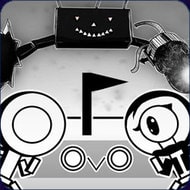I Didn’t Cheat
 0
0

I Didn’t Cheat is a psychological puzzle game set in a school where suspicion, paranoia, and logic puzzles blur together. You play as a student wrongly accused of cheating — or so you claim. Through a mix of memory reconstruction, classroom logic tests, and emotional deduction, the game challenges you to prove your innocence while everyone around you becomes more doubtful.
Prove It, Even If You’re Lying
The key mechanic in I Didn’t Cheat revolves around assembling evidence from fragments. You must reconstruct your path through the test day using objects, witness accounts, and inconsistencies in others’ testimonies. The twist? You may actually have cheated — or partially cheated — and the game dynamically shifts its logic based on what evidence you choose to present or ignore.
Rather than right and wrong answers, the system tracks plausibility and social credibility. Lie well enough, and the game rewards you. Fail to provide believable reasoning, and your credibility erodes until you’re cornered. You must think not just logically, but politically, as you debate classmates, teachers, and internal voices.
Social Pressure and Memory Gaps
Throughout I Didn’t Cheat, you’ll experience flashbacks, rapid-fire question rounds, and shifting classroom layouts that simulate anxiety and confusion. There are five stages of memory recollection, each presenting fragments of the test and your behavior. How you interpret these memories shapes the narrative and alters your character’s self-perception.
Main gameplay features include:
- Branching arguments: Choose between passive, aggressive, or evasive responses to accusations.
- Inventory logic: Use erasers, calculators, and class notes as indirect proof.
- Reputation gauge: Your classmates’ opinions change the final verdict outcome.
Multiple Outcomes and Replay Logic
There are seven endings in I Didn’t Cheat, each determined by how well you persuade others of your version of events. Some routes result in punishment even if you’re innocent, while others reward you despite clear deception. Every choice builds a timeline of character motives and relationships, and replaying the game with different assumptions reveals new paths and subtexts.
Tips for navigating the social maze:
- Take notes about each character’s priorities — they react differently to guilt or denial.
- Balance silence with persuasion; sometimes saying nothing builds more trust.
- Don’t try to win every argument — plant doubt instead.
Minimal Interface, Maximum Consequence
This is a game about words, tone, and pressure. There are no battles or action sequences, only interactive tension. I Didn’t Cheat simulates a slow unraveling where what matters isn’t whether you cheated — but whether anyone can prove it. The classroom becomes a courtroom, and every line of dialogue is evidence for or against you.
Whether you play to clear your name or manipulate everyone around you, I Didn’t Cheat turns suspicion into a sharp, emotional game mechanic where victory comes not from being innocent — but from making others believe you are.
Opinions
There are no reviews yet. Be the first one to write one.





















